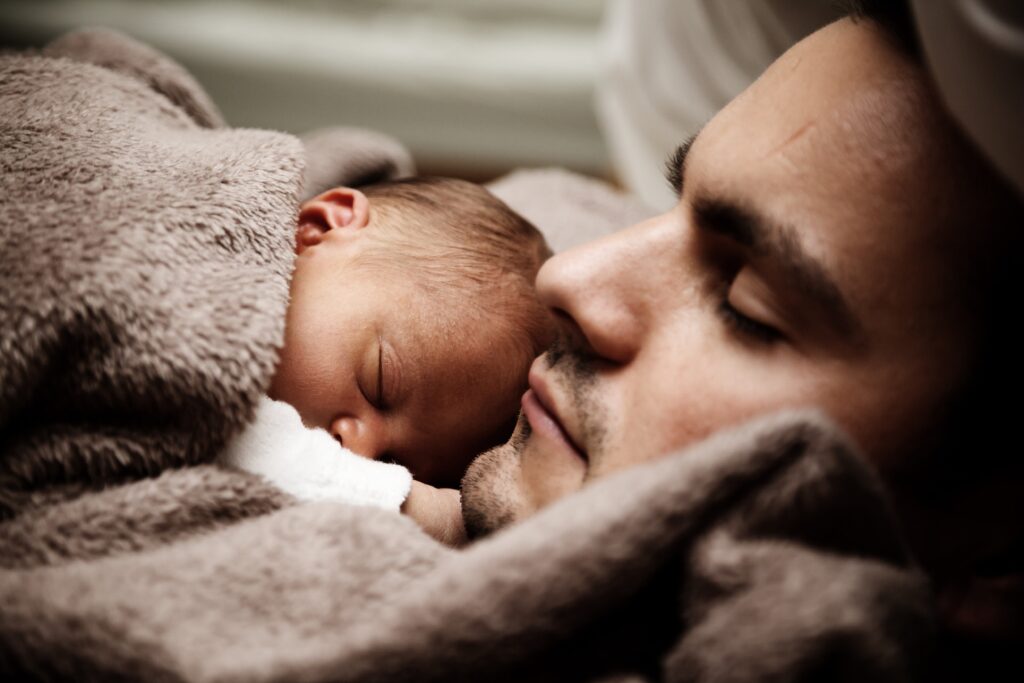Children are adorable bundles of joy, but their erratic sleep patterns can be a real challenge. Understanding what is sleep training could be your answer to providing your baby with a peaceful slumber.
Say goodbye to the struggles of bedtime battles and welcome a peaceful, restful night’s sleep for the whole family.
With these 5 expert tips, you will be able to understand when and how to start sleep training your newborn. So, if you’re yearning for a restful night’s sleep, filled with sweet dreams and quiet moments, read on
What is sleep training?
Sleep training is a method parents use to help babies learn to fall back asleep on their own. It also allows children to go back to sleep even after waking up.

In order to understand what is sleep training, it is important for you understand that babies require a continuous stretch of sleep for their cognitive and physical development.
According to studies sleep training has also been shown to reduce childhood insomnia.
Read More: What is Childhood Insomnia? Understanding 3 Alarming Causes
Once successfully trained, babies can typically sleep uninterrupted for 9-12 hours at night. This improved rest often leads to better daytime moods for both the little one and yourself, subsequently enhancing the overall quality of family life.
While daytime naps remain necessary, sleep-deprived parents, especially mothers recuperating from pregnancy insomnia, can enjoy more rejuvenating sleep because of the sleep training methods.
Depending on the approach you choose, results might show up in just a few days or take a bit longer for gentler methods that aim to minimize crying. The key to success is all about staying consistent and being patient.

Read More: How Sleep Affects Your Child’s Impulsive Behavior
When can you start sleep training?
Experts suggest starting to teach your baby good sleep habits when they’re between 4 to 6 months old. At this age, they can go for a few hours at night without needing to be fed and are learning to sleep on their own.
Before this age, babies haven’t figured out their own sleep patterns, so they might not be ready to learn. But once they reach 4-6 months, they’re more open to the idea of sleeping without your help.

Most parents start around 6 months, but you can begin as early as 4 months or as late as 9 months if it suits your family. Waiting until 9 months might work well, as some babies don’t need nighttime feeds by then.
You’ll know your baby is ready when they start falling asleep by themselves at night, even if they wake up sometimes. By understanding what is sleep training you can improve this irregular sleep pattern.
Remember, you don’t have to do this if you don’t want to. Babies eventually figure out how to sleep alone. But teaching them good sleep habits can help both of you. When babies don’t sleep well, it can be tough for everyone.
No two children are the same. There are different sleep training methods available that cater to the different needs of children.
Read More: What is Parenting: 10 Important Parenting Skills You Need
Sleep Training Methods
The following are the different types of sleep training methods that can be used for sleep training of your child:
1. Cry it out (CIO)
This method involves putting your baby to bed and letting it cry until it falls asleep without your intervention. It might seem tough, but with consistency, your baby can learn to self-soothe within a few nights. Understanding when to start sleep training newborn can also help you decide the approach towards it.
2. Ferber method
This approach allows for some soothing and attention while gradually increasing the intervals between check-ins. Over time, your baby learns to settle down independently without the need for comfort checks.
3. Chair method
With this method, you sit in a chair next to your baby’s crib until they fall asleep, gradually moving the chair further away each night until you can leave the room. It might not work for babies who can’t settle without a present.
4. Bedtime fading method
If your baby struggles to fall asleep at your desired bedtime, this method involves adjusting their sleep schedule gradually, based on their natural sleep cues, until you reach the desired bedtime.
5. Pick up, put down method
This technique entails putting your baby down while drowsy and comforting them when they cry. Repeat the process until they fall asleep, though it can require a lot of time and patience.
Each of these methods has its own advantages and challenges, so it’s essential to find the one that suits both your baby’s needs and your comfort level.
Sleep Training Tips For Parents
Remember there is no one size fit approach to what is sleep training. The following are some sleep training tips for parents to incorporate into their parenting approach:
1. Start at the Right Time
When to start sleep training newborn? This is the most important question when approaching parenting through sleep training methods.
Sleep training is typically recommended when your baby is between 4 to 6 months old. This timing is often based on their weight and developmental milestones, ensuring they are physically and neurologically ready for sleep training.
By understanding the right time when can you sleep train a newborn you will be able to move ahead of the curve.
2. Focus on Day and Night
It’s essential to focus on both nighttime sleep and daytime naps during the training process.

While nighttime sleep is crucial, mastering nap time sleep can be equally challenging. Establishing a consistent approach for both helps in building a solid sleep routine.
3. Establish a Consistent Routine
Having a regular bedtime routine is vital for helping your baby understand when it’s time to wind down and sleep.
This routine can include activities such as reading a book, singing a lullaby, or creating a calm and peaceful sleep environment to signal that it’s time for bed.
4. Set Up a Comfortable Sleep Space
Ensuring that your baby has a safe and comfortable sleep environment is crucial for successful sleep training.

This involves learning when can you start sleep training, keeping the room dark and conducive to sleep, and using consistent white noise to create a soothing atmosphere for them to rest.
5. Plan and Stay Consistent
Developing a clear plan for sleep training, including strategies for bedtime, check-ins, and night awakenings, is important.
It’s essential to stay consistent with the plan to help your baby adjust to the new sleep routine and avoid confusion during the process.
By starting at the right time, maintaining a consistent routine, and creating a comfortable sleep environment, you can help your little one develop healthy sleep habits that benefit both them and the entire family.
Can You Sleep Train A Newborn?
According to studies, many experts suggest waiting until your baby reaches the age of 4 to 6 months before embarking on the journey of sleep training.
By this time, most babies are developmentally prepared to grasp the essential skill of self-soothing, making bedtime and nighttime awakenings more manageable for both parents and little ones.

At this stage, your baby can handle those moments of crying and fussiness that may occasionally disrupt their slumber. Plus, they typically require fewer nighttime feedings.
So, while the idea of sleep training and structured schedules can be tempting, it’s wise to hold off until your baby is a bit older and better prepared for the process. Understanding the right time when can you sleep train a newborn will yield much better results.
Read More: Mental Health Tips for Kids: 5 Powerful Parenting Strategies
When To Start Sleep Training Newborn?
Research has revealed that around 20 percent of children aged 1 to 3 still experience regular night awakenings.
But it’s important to remember that it’s never too late to cultivate healthy sleep habits. The key objective of sleep training, regardless of age, is to encourage independent sleep initiation in children.

For toddlers, maintaining consistency and setting boundaries are crucial. Experts often recommend methods such as the ‘pick up/put down’ or the ‘Ferber’ method for this age group.
Ensuring that your toddler gets 1 or 2 naps each day, maintains a bedtime around 7 p.m., and follows a bedtime routine lasting no longer than 30 minutes can significantly contribute to the success of these methods.
When it comes to newborns, the ideal time to consider sleep training is typically between the 3 and 4 month mark.
At this stage, a baby’s increased stomach capacity allows for longer periods of sleep without the need for feeding. By the age of 4 months, most babies can manage a stretch of 8 to 12 hours at night without requiring a feed.
Read More: Child Development: 12 Signs And How It Can Mental Health
A Peaceful Slumber
In understanding what is sleep training, you can effectively regulate your child’s sleep patterns, leading to a more restful night for the whole family. While the process may present challenges, the benefits of improved sleep for both you and your baby make the journey worthwhile.
Furthermore, by implementing essential sleep training tips for parents you can contribute to the successful development of healthy sleep habits in your child.
By learning about various sleep training methods, including the ‘Cry it out’ method, the ‘Ferber’ method, the ‘Chair’ method, the ‘Bedtime fading’ method, and the ‘Pick up, put down’ method, you can find the right approach that suits your child’s needs and your parenting style.
Frequently Asked Questions (FAQs)
1. What is sleep training?
Sleep training is a method that helps babies learn to fall asleep on their own, encouraging them to self-soothe when they wake up during the night.
2. What are sleep training methods?
Some common sleep training methods include the ‘Cry it out’ method, the ‘Ferber’ method, the ‘Chair’ method, the ‘Bedtime fading’ method, and the ‘Pick up, put down’ method.
3. What are sleep training tips that parents can use?
Parents can utilize various tips, such as starting at the right time, focusing on both daytime and nighttime sleep, establishing a consistent bedtime routine, creating a comfortable sleep environment, and maintaining consistency with the plan.
4. Can you sleep train a newborn?
While it’s recommended to wait until a baby is 4 to 6 months old before initiating sleep training, it’s crucial to note that sleep training for newborns can begin around the 3- to 4-month mark, considering their increased capacity to sleep for longer periods without needing to feed.
5. When can you start sleep training?
Experts suggest starting sleep training when your baby is between 4 to 6 months old, as they are more developmentally prepared to handle the process and establish healthy sleep habits.












Leave a Reply